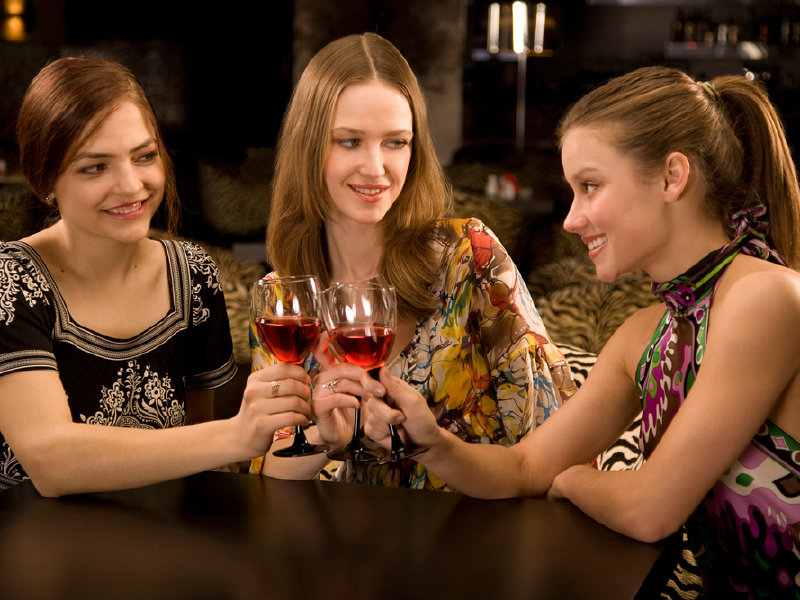"Bar Month" at OnMilwaukee.com is back for another round – brought to you by Aperol, Pinnacle, Jameson, Fireball, Red Stag and Avion. The whole month of February, we're serving up intoxicatingly fun articles on bars and clubs – including guides, the latest trends, bar reviews and more. Grab a designated driver and dive in!
Everyone knows about peer pressure for teens. Parents, teachers and guidance counselors drill preventive measures into the youth of America from middle school through high school. Teens and tweens are warned time and time again that just because all their friends are doing something doesn’t make it cool or necessary.
But our culture seems to take in stride the prevalence of peer pressure in the adult world, especially where alcohol is concerned – and especially here in Milwaukee. In this city built by immigrants, people are proud of their cultural heritage – and that often extends to a pride in alcoholic tolerance. Social drinking in particular is ubiquitous; considered almost essential to Milwaukee’s beloved sense of Gemütlichkeit.
And those who abstain – for whatever reason – are often seen as just plain strange.
"Wisconsinites drink. We drink a lot. We’re professionals," says Paul Bitzan of Milwaukee. "We hold in high regard those of us that can ‘hold our liquor.’ What may be considered ‘binge drinking’ in other regions is called ‘Tuesday’ here in southeastern Wisconsin"
As a married father with responsibilities, Bitzan says he simply lacks the time and the will to pay the price of alcohol consumption, and usually abstains. This causes raised eyebrows in his social circle.
"It’s as if you are committing some kind of social taboo," he says. "Obviously, I cannot speak for women, but when a man chooses not to drink alcohol around here, people will figure he’s a recovering alcoholic or they’ll question his masculinity."
Emily Campbell is a Milwaukee native who attended school at what many consider to be America’s drunkest university: UW-Madison.
"In my four years at UW-Madison I can't recall a single experience where a friend or acquaintance openly acknowledged the potential dangers of alcohol and binge drinking – until they were experiencing the consequences, of course," she recalls.
"It simply is not discussed. In fact, some of my closest friends who did not and would not drink a drop of alcohol throughout high school picked up a drink day one of college, as if some danger gate had suddenly released them, and never slowed down."
Campbell currently makes her home in Madison and has recently started the Paleo diet (also known as the "caveman" diet) which prohibits consumption of alcohol. She reports that the experience has been a surprisingly isolating one.
"Friends will go on for as long as 20 minutes trying to find a loophole in the plan's dietary restrictions and will try to reason me into drinking," she says. Common arguments waged by friends who are unhappy to be suddenly drinking alone include: "Cavemen totally had alcohol." "One drink won't hurt you." "Well, what about just red wine? Jesus had wine."
Dr. Michael Miller is the medical director of the Herrington Recovery Center at Rogers Memorial Hospital in Oconomowoc. He says that adult peer pressure is a common challenge faced by his patients, many of whom present with alcoholism, and that in treatment he often engages his patients in role-playing social situations where companions encourage them to drink.
"This is certainly a cultural challenge – one of the factors in using any drug, whether it be alcohol or something else, is the extent to which the culture supports using or supports abstaining, and our culture is very supportive of heavy use," he says.
"I’ve spent my entire career in Wisconsin and it’s the case in other places – it’s certainly not unique to Wisconsin. But most social events here are alcohol-related; even sporting events are very heavily alcohol-related. Wisconsin has the highest rate of adults who engage in binge drinking, especially females."
Bitzan agrees that Wisconsin has a unique pride in its ability to drink all other 49 states under the table.
"I think there is a fair population in this region who are proud to be drinkers," he says. "When one of us does not share that regional pride, it may be that others take that as an insult to the culture."
As someone who has all but renounced alcohol, he says he is met with reactions that have ranged from "a quick shrug of the shoulders to mild excommunication." His decision to abstain from alcohol isn’t a big deal to him, but it is to many others.
"Some people can’t handle it. They think there must be something wrong with me; that I’ve found Jesus; that I think I’m better than them. The truth is that I just don’t enjoy it anymore."
Dr. Miller reports that those who break away from the cultural norm of indulgence (and, often, overindulgence) are viewed with suspicion.
"All of these cliches actually do apply to the Wisconsin scene, that if someone who declines to drink is considered to be different and maybe encouraged to, ‘Oh, just try one,’" he says.
"Because people realize how normative it is to drink in Wisconsin, they feel like they’ll make someone else uncomfortable if they abstain, so they may drink just to not create an embarrassing situation or some level of tension between them and the people around them."
"Misery loves company," Bitzan agrees. "Someone may say, ‘You’re not as much fun when you don’t drink.’ I think there’s some truth to that. However, there’s also some truth to the idea that being sober around drunk people is not very fun, either. So someone who is looking to lose their inhibitions is not as likely to do so when their friend is stone-cold sober."
For many, drinking fine wine and craft beer is more than a pastime – it’s a hobby, says Milwaukee resident Eileen Bennett.
"Pretty much any gathering of young adults involves alcohol in one way or another. Sporting events, wedding showers, rec softball games, work parties – you name it, alcohol is an expectation. It's a form of social bonding, and for some a certain type of drinking might be a hobby such as craft beer or wine. If there is a party happening that I know is going to involve heavy drinking and I'm not in the mood for that, I can expect to be pressured into drinking more than I want."
She suggests planning ahead. "If you show up to a social event knowing that there will be drinking but make the decision not to, you can still have a fun time because you went into the situation knowing that you would socialize without alcohol."
And be sure to have an equally sober wingman. "It helps to go with someone who is also committed to keeping a low limit because then you can keep each other in check and you don't have to feel like the loner who isn't drinking much."
Campbell copes with scrutiny by trying to avoid it altogether. Her new favorite recreational beverage? Seltzer water with a lemon wedge.
"It appears that I am drinking when I am not, I feel more comfortable, and most of the time nobody is the wiser," she said. "You can also volunteer as the DD if you're looking for an easy out. If you do make your choice public, I think it is extremely helpful to have a few quick, go-to lines prepared to shut up the haters when they ask why you're not drinking or start laying on the pressure. Being direct, clear and confident in asking for their respect and support can go a long way."
Ultimately, she says, the peer pressure is definitely out there. But it’s up to each individual to know their own limit and adhere to it.
"To be honest, the peer pressure and goading from friends is annoying and frustrating, but it's so much easier to ignore the haters than it is to overcome the pressures you feel internally," she says. "My friend chanting in my ear to ‘drink drink drink’ isn't going to get me to buy a beer; but being the only person in the room without a drink in your hand? Now that's pressure."
And don’t be too quick to assign blame to the culture of Wisconsin in the case of real alcoholism.
"Drinking is not a problem except for people who have a problem with alcohol," says Dr. Miller. "Binge drinking is not synonymous with alcoholism. But the likelihood for someone developing an addiction when they drink is more related to genetics than anything else. We have to remember that addiction whether it be alcohol or opioids or anything else is a brain disease with a strong genetic component."
Colleen Jurkiewicz is a Milwaukee native with a degree in English from the University of Wisconsin-Milwaukee, and she loves having a job where she learns something new about the Cream City every day. Her previous incarnations have included stints as a waitress, a barista, a writing tutor, a medical transcriptionist, a freelance journalist, and now this lovely gig at the best online magazine in Milwaukee.







